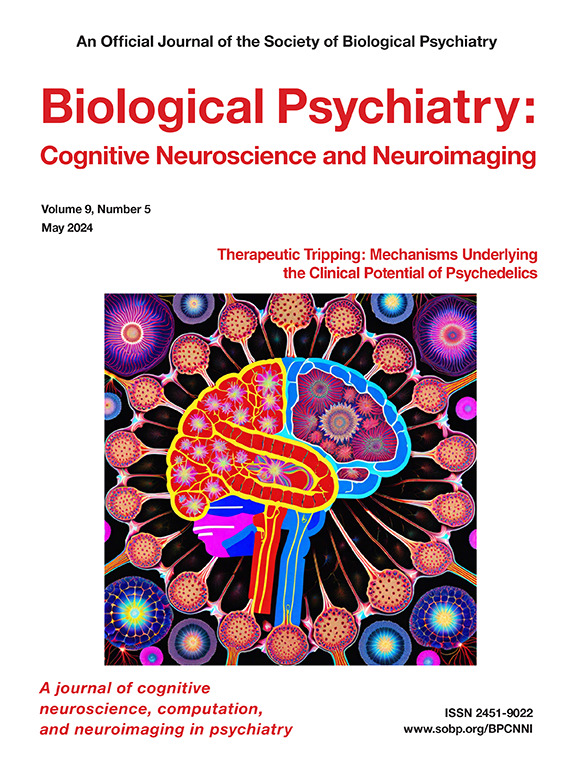Opposite-Direction Spatial Working Memory Biases in People With Schizophrenia and Healthy Control Participants
IF 5.7
2区 医学
Q1 NEUROSCIENCES
Biological Psychiatry-Cognitive Neuroscience and Neuroimaging
Pub Date : 2025-02-01
DOI:10.1016/j.bpsc.2024.09.008
引用次数: 0
Abstract
Background
People with schizophrenia (PSZ) show impaired accuracy in spatial working memory (sWM), which is thought to reflect abnormalities in the sustained firing of feature selective neurons that are critical for successful encoding and maintenance processes. Recent research has documented a new source of variance in the accuracy of sWM: In healthy adults, sWM representations are unconsciously biased by previous trials such that current-trial responses are attracted to previous-trial responses (serial dependence). This opens a new window to examine how schizophrenia impacts both the sustained neural firing representing the current-trial target and the longer-term synaptic plasticity that stores previous-trial information.
Methods
We examined response accuracy in a single-item sWM test with delay intervals of 0, 2, 4, or 8 seconds in 41 PSZ and 32 demographically similar healthy control participants. Our main dependent variable was the bias index, which quantifies the extent to which the current-trial responses were biased toward or away from the previous-trial target.
Results
PSZ showed opposite-direction serial dependence bias effects: Healthy control participants showed an attractive bias that increased over increasing delays whereas PSZ showed a repulsion bias that increased over delays. In PSZ, the magnitude of the repulsion bias negatively correlated with broad measures of cognitive ability and WM capacity.
Conclusions
PSZ show opposite-direction effects of previous trials on WM. Such qualitatively distinct differences in performance are extremely rare in psychopathology and may index a fundamental alteration in neural processing that could serve as a valuable biomarker for pathophysiology and treatment development research.
精神分裂症患者和健康对照组的反方向空间工作记忆偏差。
背景:精神分裂症(PSZ)患者的空间工作记忆(SWM)准确性受损,这被认为反映了特征选择神经元持续发射的异常,而特征选择神经元对于成功编码和维持过程至关重要。最近的研究发现了空间工作记忆准确性差异的一个新来源:在健康的成年人中,空间工作记忆表征会不自觉地受到先前试验的影响,从而使当前试验的反应被先前试验的反应所吸引(序列依赖)。这为研究精神分裂症如何影响代表当前试验目标的持续神经发射和存储先前试验信息的长期突触可塑性打开了一扇新窗口:我们研究了 41 名精神分裂症患者和 32 名在人口统计学上相似的健康对照者(HCS)在延迟间隔为 0、2、4 或 8 秒的单项 SWM 测试中的反应准确性。我们的主要因变量是偏差指数,它量化了当前试验的反应偏向或偏离上一试验目标的程度:结果:PSZ 显示了反方向的序列依赖偏倚效应:HCS表现出的吸引偏向随着延迟的增加而增加,而PSZ表现出的排斥偏向随着延迟的增加而增加。在 PSZ 中,排斥偏差的大小与认知能力和 WM 能力的广泛测量呈负相关:结论:PSZ 表现出先前试验对 WM 的反方向影响。这种表现上截然不同的定性差异在精神病理学中极为罕见,可能表明神经处理过程发生了根本性的改变,可作为病理生理学和治疗开发研究的重要生物标志物。
本文章由计算机程序翻译,如有差异,请以英文原文为准。
求助全文
约1分钟内获得全文
求助全文
来源期刊

Biological Psychiatry-Cognitive Neuroscience and Neuroimaging
Neuroscience-Biological Psychiatry
CiteScore
10.40
自引率
1.70%
发文量
247
审稿时长
30 days
期刊介绍:
Biological Psychiatry: Cognitive Neuroscience and Neuroimaging is an official journal of the Society for Biological Psychiatry, whose purpose is to promote excellence in scientific research and education in fields that investigate the nature, causes, mechanisms, and treatments of disorders of thought, emotion, or behavior. In accord with this mission, this peer-reviewed, rapid-publication, international journal focuses on studies using the tools and constructs of cognitive neuroscience, including the full range of non-invasive neuroimaging and human extra- and intracranial physiological recording methodologies. It publishes both basic and clinical studies, including those that incorporate genetic data, pharmacological challenges, and computational modeling approaches. The journal publishes novel results of original research which represent an important new lead or significant impact on the field. Reviews and commentaries that focus on topics of current research and interest are also encouraged.
 求助内容:
求助内容: 应助结果提醒方式:
应助结果提醒方式:


